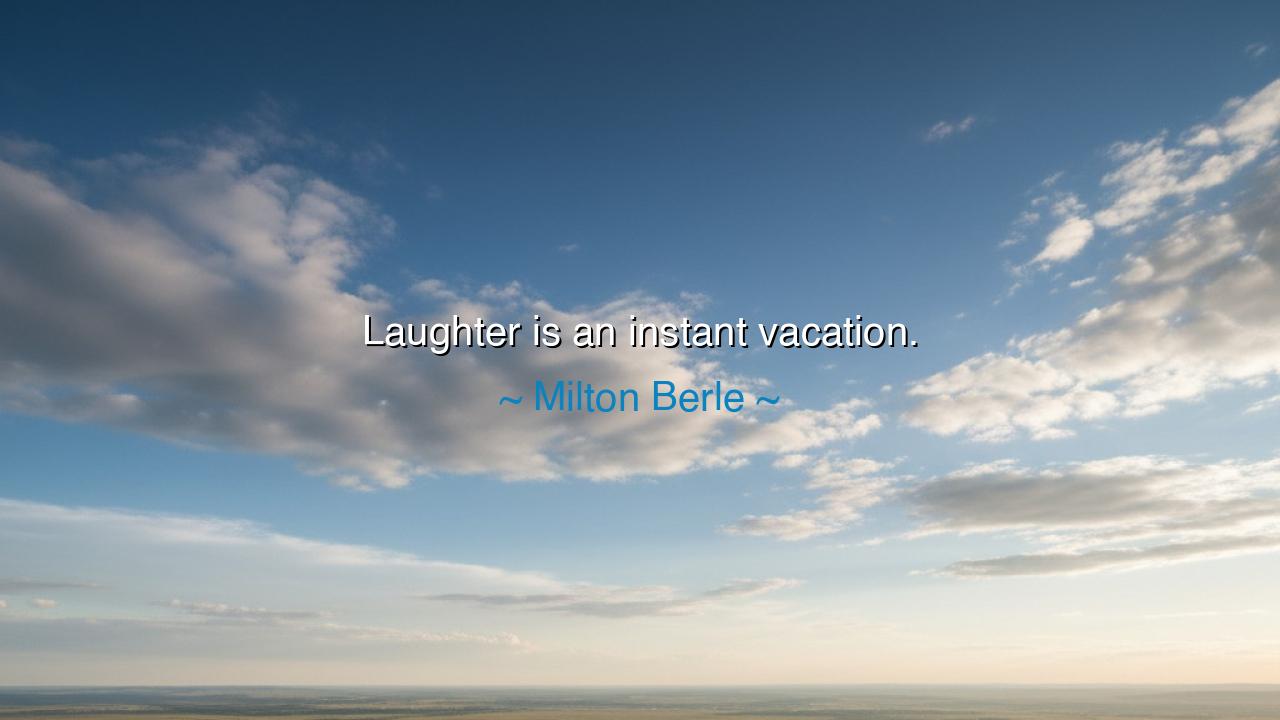
Laughter is an instant vacation.






“Laughter is an instant vacation.” So said Milton Berle, the great American humorist, whose words carry a lightness that belies their depth. In this simple phrase, he revealed a truth the ancients would have called divine — that laughter is the soul’s swift escape from the burdens of existence. It does not require ships or coin, nor does it wait for the turning of the year. It is a vacation granted by the spirit itself, a doorway into peace that opens not outward, but inward. With a single burst of laughter, the heart forgets its chains, and for that instant, man becomes free again.
For the ancients, such freedom was the essence of the good life. They knew that joy, even momentary, renews the strength of the weary. The Romans, who built empires yet feared despair, said that “a day without laughter is a day wasted.” Berle’s modern phrasing is but a reflection of this old wisdom, spoken through the lens of a man who made a nation laugh when times were hard. He understood that laughter is not mere amusement — it is an act of renewal, a brief but sacred release from sorrow, a kind of resurrection of the spirit.
Consider those years of war and depression when Berle’s voice echoed through the radios of countless American homes. Families sat together, burdened by hunger and uncertainty, and yet — for a few minutes each night — they laughed. In that laughter, they forgot their troubles; the walls of their small apartments dissolved, and they felt once more the joy of being human. This is what Berle meant by an instant vacation — not a journey to a far land, but a lifting of the heart from the weight of the world. The poor man who laughed was, for that instant, as rich as a king.
The ancient philosophers spoke of this same mystery. Epicurus, who sought happiness not in luxury but in tranquility, might have said that laughter is the mind’s retreat to simplicity. The Stoics, though stern, believed that even in adversity one might find serenity through inner mastery — and laughter, the spontaneous outpouring of life, is a form of such mastery. It transforms pain into play, tragedy into tale, fear into folly. When a man laughs, he claims dominion over his own despair.
To laugh, then, is not an escape from reality — it is a return to it, purified. For when laughter comes, the soul remembers that existence is not a sentence, but a gift. The farmer at his plow, the mother at her work, the scholar at his books — all carry burdens. Yet let one of them pause to laugh, and suddenly their labors become lighter. The ancients knew this: that laughter is not the enemy of seriousness, but its companion. It restores proportion to life, reminding us that nothing — no grief, no worry — is truly endless.
There is a story told of Abraham Lincoln, who, even in the darkest days of the Civil War, would read aloud from a book of humorous tales to his cabinet. His advisors were often scandalized. “Mr. President,” they said, “how can you laugh when the nation burns?” But Lincoln, with eyes weary from sleepless nights, replied, “If I could not laugh, I could not live.” In that moment, he revealed the same truth that Berle would one day echo: laughter is not denial — it is survival. It is the brief rest between battles, the breath before the next burden.
And so, my children, remember this teaching: seek laughter as you would seek rest. Do not wait for life to become easy before you allow yourself to smile. For laughter does not depend on fortune — it creates it. It is the soul’s vacation from sorrow, the reminder that joy still dwells within. When troubles gather, find a reason to laugh, even if it is small. When the day grows long, share laughter with another, for shared joy multiplies, while shared sorrow divides.
Laughter is an instant vacation — not because it takes you away from life, but because it returns you to it with clearer eyes and a lighter heart. Protect it, cultivate it, and offer it freely. For as long as you can laugh, you remain unconquered. The body may tire, the world may wound, but






AAdministratorAdministrator
Welcome, honored guests. Please leave a comment, we will respond soon